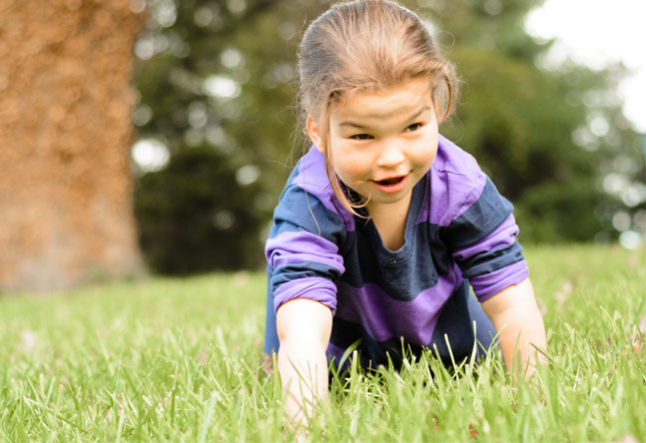yoga for people with disabilities

While so many of us may feel disabled as we try to touch the floor in triangle pose or rest our knees by our ears in plough pose, we take for granted that we can move in these directions. On the same note, many individuals with disabilities assume that yoga, as a rule, is not for them. To make matters worse, there are plenty of open-minded and caring yoga practitioners who are disabled in their own way by their ignorance of where to begin in working with the disabled. Luckily, there are teachers like JoAnn Lyons and Saraswathi Devi who are teaching those who perhaps need yoga more than anyone, and are training other teachers to do the same.
In her work at Piedmont Yoga Studio, JoAnn Lyons has been part of the advanced studies program, in which she pulled from years of experience-based wisdom to guide newer teachers. She also currently teaches a weekly class for people with disabilities. Having gotten her start at the Cerebral Palsy Center in Oakland more than a decade ago, she brings a confident attentiveness and presence to her teaching that seems to earn trust and loyalty from her students. After hearing reports of her having helped move people in wheelchairs into headstands, I embraced the opportunity to visit one of these amazing classes. She made demands on her students that I, personally, would be ashamed to make, asking that they use muscles that seemed to be utterly unknown to their bodies.
One woman protested when JoAnn asked her to copy the pose of another student in the class and lift her body up off her sit-bones. “I can’t do it like her,” she complained, a protest that rang so familiar in my ears, one that perhaps we all have heard, albeit internally, every single time we go to a yoga class. “All I am asking is that you do it as best you can,” JoAnn answered – a familiar yoga consolation. Each person has certain poses that are easy and some that are more challenging; we are always going to be different from our neighbor.
Saraswathi Devi, of Berkeley’s Yogalayam ashram, is another Bay Area teacher offering practice for yogis with disabilities. She provides a boldly different experience from Lyons’ class through the CalStar yoga program, in which she has been offering classes for people with disabilities for about ten years. The program is located in the University of California’s (UC Berkeley) Recreational Student Facility, an accessible, dynamic and decidedly less tranquil setting. However, despite the slightly noisier atmosphere, the hands-on attention available to practitioners is abundant. In fact, there are two assistant teachers and about 35 volunteers, mostly trained UC students who earn academic credit by helping to assist in the class of about 20 disabled students.
Saraswathi has been a yoga teacher for three decades in service to her teacher, Swami Vignanananda. Her teaching style is aimed at a wide array of people who come to the CalStar class for a variety of reasons, but she herself is strongly rooted in a holistic approach to yoga, as it comprises both a lifestyle and a grounding spiritual path for her. Perhaps this is why she says that teaching the disabled has been “like touching the heart of creation.” She believes that yoga has much therapeutic value, even when a person is not able to move into postures independently. Through receiving assistance, students can exercise their muscle memory and strengthen bone tissue by putting weight on body parts that have grown unaccustomed to carrying it. The students with disabilities find themselves more energetic, sleeping better, and improving their digestion and circulation. Most of all, however, Saraswathi is looking to give them a sense of compassion and respect for their body that is constantly revitalizing itself.
Hatha yoga is unique in that, unlike purely physical fitness practices, it is part of a much greater body of knowledge and philosophy about our presence on this planet. While the physical plane is a part of this, watching and working with people who have disabilities reminded me that yoga is about opening the heart. It is about fun and healing on many levels. Yoga and disabilities are in perfect harmony.
Read next >> how to stop negative self talk